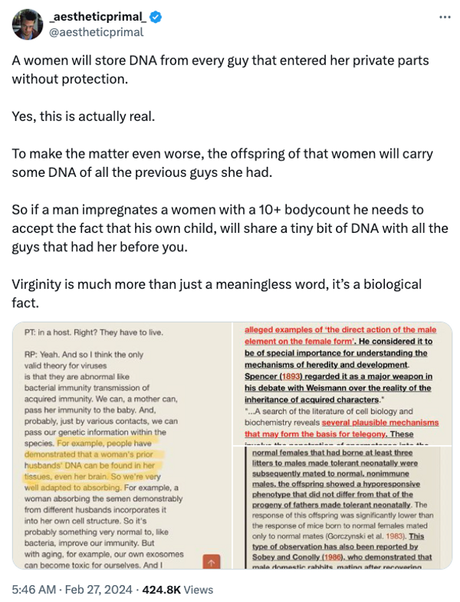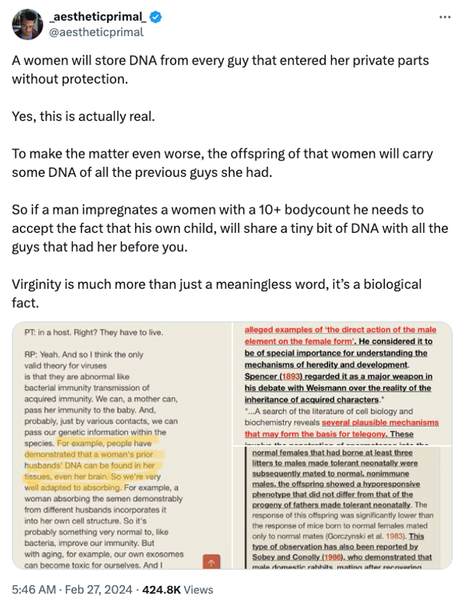Women absorb and retain DNA from every man they have sex with.
Judgement: 

In late February 2024, a claim that women "store DNA from every man" they have ever had sexual intercourse with went viral on X (formerly Twitter):


Nothing in the above message contains any biological fact.
The claim, which has been circulating online for years, stems from research into a phenomenon in which male cells are present in the tissue of human women: male microchimerism. Most, but not all, cases of this condition result from tissue derived from the pregnancy of a male fetus. Although the source of male DNA in women who have never had a pregnancy is an ongoing question in science, sexual intercourse is only one of the speculative sources of male microchimerism.
This same claim has gone viral several times since 2012, usually in defense of conservative social policies. Snopes first fact-checked the claim in June 2017, when the website known as Your News Wire (which currently goes by many names, including The People's Voice) posted an article claiming that "Women absorb and retain DNA from any man they have sex with."
That article claimed that "a new study" showed that cells transferred from a man to a woman during intercourse are integrated into that woman's body "every time" after sex. In reality, the study they referenced, published in 2012 in PLoS ONE, demonstrated male microchimerism in female brain tissue in 63% of the 59 women the researchers analyzed post-mortem.
Those researchers did not look for, and did not draw any conclusions in their study, about the likelihood of intercourse-related microchimerism. The significance of the paper was that it showed that male cells were able to cross the so-called blood-brain barrier - a semi-permeable membrane that prevents most chemicals in the blood from entering the brain. In fact, that study does not mention intercourse once as a proposed mechanism. This is as close as possible to the 2012 study when it comes to the source of those cells:
The story continues
The most likely source of men [microchimerism, Mc] in the female brain, acquisition of fetal Mc occurs during pregnancy with a male fetus. In women without sons, male DNA can also be obtained from an abortion or miscarriage. Pregnancy history was unknown for all but a few subjects in the current studies, i.e. male Mc in the female brain [tissue] could not be assessed based on the specific previous pregnancy history. In addition to previous pregnancies, male Mc can be acquired by a woman from a recognized or lost male twin, an older male sibling, or via non-irradiated blood transfusion.
An article published in 2015 explored this topic further and concluded that - possibly - all of these potential mechanisms could contribute. That paper, which was quite limited in its data set, makes it clear that the transmission of sexual intercourse by male chimerism remains entirely speculative:
Data indicate that male microchimerism in young girls may originate from an older brother, either born full-term, or from an aborted pregnancy, or from transfusion during pregnancy. We speculate that sexual intercourse may be important, but that other sources of male cells likely exist in young girls.
Research conducted since Snopes' original 2017 fact-check has shed some, but not much, additional light on the origins and meaning of male microchimerism. For example, a September 2021 study reaffirmed the existence of male microchimerism in women who had never been pregnant. Although the authors acknowledged the hypothesis that sexual intercourse could be a source, they said their research could not answer that question and proposed other alternative hypotheses:
Our study indicates that the origin of the microchimeric cells may not necessarily be a close relative. One source is the repeated sequential exchange between fetus and mother over generations. Possible further sources include unreported or unrecognized interrupted pregnancies, breastfeeding, the structure of the placenta, pregnancy complications including preeclampsia, and it has also been suggested that sexual intercourse may play a role. We did not have these data available for a sufficient number of participants for comprehensive analyzes of these alternatives.
All in all, science can say with certainty that many - but not all - women have some male cells in their tissue and that most of these cases - but not all - are associated with a pregnancy with a male fetus. Science cannot answer with certainty whether sexual intercourse is a potential source of male cells in cases where pregnancy has not occurred, but it absolutely cannot say that a woman will "store DNA from any man who penetrates her genitals without protection." Science isn't even sure that such a phenomenon even occurs.
Because the science underlying the claim that women retain the DNA of all the men they have ever slept with is misrepresented, the claim is false.
Sources:
Chan, William FN, et al. 'Male Microchimerism in the Human Female Brain.' PLoS ONE, edited by Martin Gerbert Frasch, vol. 7, no. 9, September 2012, p. e45592. DOI.org (crossref), https://doi.org/10.1371/journal.pone.0045592.
Funke, Daniel. "Fact checkers have debunked this fake news site 80 times. The site is still published on Facebook." Poynter, July 20, 2018, https://www.poynter.org/fact-checking/2018/fact-checkers-have-debunked-this-fake-news-site-80-times-its-still-publishing-on- facebook/.
Johnson, BN, et al. "Male Microchimerism in Females: A Quantitative Study of Twin Pedigrees to Investigate Mechanisms." Human Reproduction, vol. 36, no. 9, August 2021, pp. 2529-37. DOI.org (crossref), https://doi.org/10.1093/humrep/deab170.
Müller, Amanda Cecilie, et al. "Male Microchimerism in a Cohort of Danish Girls." Chimerism, vol. 6, no. 4, October 2015, pp. 65-71. DOI.org (crossref), https://doi.org/10.1080/19381956.2016.1218583.
Yan, Zhen, et al. 'Male Microchimerism in Women Without Sons: Quantitative Assessment and Correlation with Pregnancy History.' The American Journal of Medicine, vol. 118, no. 8, August 2005, pp. 899-906. DOI.org (crossref), https://doi.org/10.1016/j.amjmed.2005.03.037.
